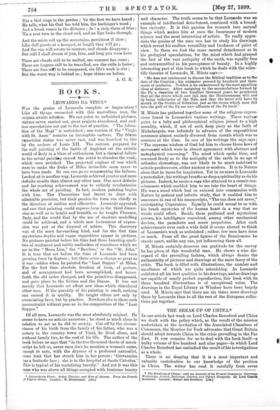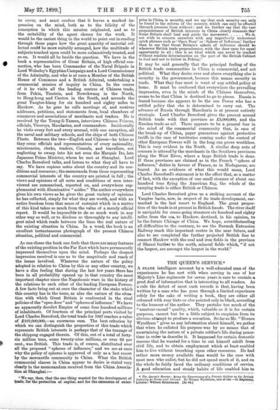THE BREAK-UP OF CHINA.*
IN our article last week on Lord Charles Beresford and China we dealt with the policy which, as the result of the mission undertaken at the invitation of the Associated Chambers of Commerce, the Member for York advocates that Great Britain should adopt towards China in the crisis prevailing in the Far East. It now remains for us to deal with the book itself—a. bulky volume of five hundred and nine pages—in which Lord Charles Beresford has embodied the result of his investigations as a whole.
There is no denying that it is a most important and valuable contribution to our knowledge of the position in China. The writer has read it carefully from cover
• The Break-up of China : with an Account of its Present Commerce, Currency, Waterways, Armies, Railways, Polftws, and Future Prospects. By Lord Chance Beresford. London : Harper and Brothers. Ws] to cover, and must confess that it leaves a marked im- pression on the mind, both as to the felicity of the conception in which this mission originated, and as to the suitability of the agent chosen for the work. It would be the easiest thing in the world to point out in reading through these pages how the great quantity of material col- lected could be more suitably arranged, how the multitude of subjects touched upon could be more exhaustively treated, and so on. It would all be beside the question. We have in the O book a representative of Great Britain, of high official con- nection, who has been Commander of the Naval Brigade in Lord Wolseley's Egyptian Campaign and a Lord Commissioner of the Admiralty, and who is at once a Member of the British House of Commons and a British Admiral, undertaking a commercial mission of inquiry in China. In the course of it he visits all the leading centres of Chinese trade, from Pekin, Tientsin, and Newchwang in the North, to Hong-kong and Canton in the South, and ascends the great Yangtse-kiang for six hundred and eighty miles to Hankow. As he goes he calls meetings of, and receives addresses, petitions, and statements from, local chambers of commerce and associations of merchants and traders. He is received by the Tsung-li-Yamen, interviews Chinese Princes, officials, Viceroys, Mandarins, and commanders. Incidentally he visits every fort and every arsenal, with one exception, all the naval and military schools, and the ships of both Chinese Fleets. Between the two—English and Chinese—he takes as they come officials and representatives of every nationality, missionaries, clerks, traders, Consuls, and travellers, not neglecting to sweep into his net even the Marquis Ito, late Japanese Prime Minister, whom he met at Shanghai. Lord Charles Beresford talks, and listens to what they all have to say. We have copious notes about the country and its con- ditions and resources; the memoranda from those representing commercial interests of the country are printed in full ; the views and opinions of all sorts and conditions of men inter- viewed are summarised, reported on, and everywhere sup- plemented with illuminative "asides." The author everywhere gives his own views as he gives the great variety of opinions he has collected, simply for what they are worth, and with an entire freedom from that sense of restraint which in a matter of this kind takes so much from the value of a merely official report. It would be impossible to do so much work in any other way so well, or to disclose so thoroughly to any intelli- gent mind which reads between the lines the real nature of the existing situation in China. In a word, the book is an excellent instantaneous photograph of the present Chinese situation, political and commercial.
As one closes the book one feels that there are many features of the existing position in the Far East which have permanently impressed themselves upon the mind. Perhaps the deepest impression received is one as to the magnitude and reach of the issues involved. Whatever the nature of the policy adopted in relation to China by this or any other country, we have a dim feeling that during the last few years there has been in all probability opened up in that country the most important chapter since the Napoleonic wars in the history of the relations to each other of the leading European Powers. A few facts bring out at once the character of the stake which this country has in the issue, as also the nature of the situa- tion with which Great Britain is confronted in the rival policies of the "open door" and "spheres of influence." We have an apparently derelict Empire of some four hundred millions of inhabitants. Of fourteen of the principal ports visited by Lord Charles Beresford, the total trade for 1897 reaches &value of £107,000,000,—an enormous sum. The best criterion by which we can distinguish the proportion of this trade which represents British interests is perhaps that of the tonnage of the shipping engaged therein. Of this, out of a total of forty- six million tons, some twenty-nine millions, or over 62 per cent., was British. This trade is, of course, distributed over all the proposed "spheres of influence," and we see at once why the policy of spheres is approved of only as a last resort by the mercantile community in China. What the British commercial classes in China appear to desire is stated very clearly in the memorandum received from the China Associa- tion at Shanghai :— " Wo say, then, that the one thing wanted for the development of trade, for the protection of _capital, and for the extension of enter-
prise in China, is security, and we say that such security can only be found in the reform of the country, which can only be effected through presstue from without : and we further say that the vast preponderance of British interests in China clearly demands that
Great Britain shall lead and guide the movement We dc not wish to concern ourselves with any imperfectly understood catch phrases such as Open Door' or Sphere of Influence,' further than to say that Great Britain's sphere of influence should be wherever British trade preponderates, with the door open for equal opportunity to all ; this is an ideal which can never be reached without resolute determination on the part of the British Cabinet to lead and not to follow in Peking."
It may be said generally that the principal feeling of the British trade communities in China is commercial, and not political. What they desire over and above everything else is security in the government, because this means security in trade. What they fear most is want of any settled policy at home. It must be confessed that everywhere the prevailing impression, even in the minds of the Chinese themselves, seems to be that China is destined to go to pieces. Russia is feared because she appears to be the one Power who has a settled policy that she is determined to carry out. The advance of Russia through Manchuria is at present entirely strategic. Lord Charles Beresford gives the present annual British trade with that province as 23,000,000, and the Russian trade as nil. There appears to be a general fear in the mind of the commercial community that, in case of the break-up of China, paper guarantees against protective tariffs in the case of territories coming under the control of other European Powers will in the long run prove worthless.
This is very evident in the North. A similar deep note of concern is uttered by the merchants in the Southern provinces along the West River, where a large British trade is done. If these provinces are claimed as in the French "sphere of influence," duties in favour of France, as in Madagascar, are feared. As an evidence of what this would mean, Lord Charles Beresford's statement is to the effect that, as a matter of fact, with the exception of one small steamer of about one hundred tons flying the American flag, the whole of the carrying trade is either British or Chinese.
Lord Charles Beresford gives us a striking account of the Yangtse basin, now, in respect of its trade development, ear- marked in the last resort to England. The great propor- tion of the trade is at present in British hands. The river itself is navigable for ocean-going steamers six hundred and eighty miles from the sea, to Hankow, destined, in his opinion, to be the future Chicago of China. We hope, notwithstanding all difficulties to the contrary, to see the Burmah Extension Railway reach this important centre in the near future, and also to see completed the further projected British line to connect Hankow with the coal and iron fields in the province of Shansi further to the north, mineral fields which, "if not the largest, are amongst the largest in the world."







































 Previous page
Previous page